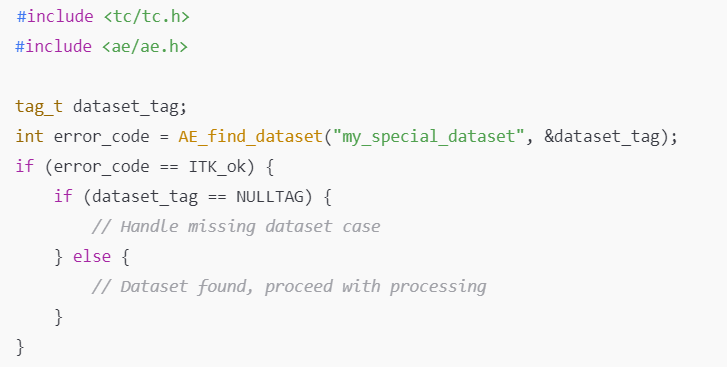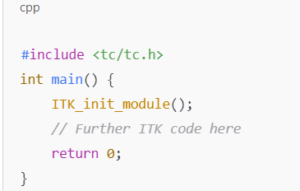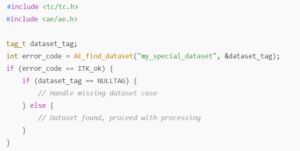
Teamcenter ITK
Teamcenter ITK (Integration Toolkit) programming opens the door for highly customized solutions in Product Lifecycle Management (PLM). By mastering Teamcenter ITK, developers can tailor Teamcenter to meet specific business needs, from automating processes to integrating external systems. However, diving into ITK programming requires an understanding of its foundational components, particularly **include files**. These files provide essential definitions, data types, and constants, ensuring our programs can leverage the powerful Teamcenter APIs.
In this blog post, we’ll cover the role of include files, key modules, and best practices to help you get the most out of ITK programming.
1. Starting with the Basics: `tc/tc.h`
The file `tc/tc.h` is mandatory for every ITK program. It’s where we get access to essential data types, constants, and functions that almost every ITK program relies on. This includes:
– **`ITK_init_module`**: The function that kicks off any ITK session.
– **Standard Data Types**: Such as `tag_t`, which serves as a runtime unique identifier for all objects in ITK.
– **Constants**: Including `ITK_ok`, which indicates success and is fundamental for error checking.
**Why it’s important**:
Without `tc/tc.h`, an ITK program can’t initialize or access these core Teamcenter elements. Including it is the first step for any ITK script or application.
**Example**:

—
2. Navigating the Include File Structure – Teamcenter ITK
Teamcenter organizes its include files within the **`TC_ROOT/include` directory**. Each file is stored in a subdirectory related to its module, and each module offers its own set of files to streamline your code’s functionality.
For instance, if you’re working with workflows and need to include `epm.h`, you’ll reference it with the subdirectory path:
“`cpp
#include <epm/epm.h>
“`
This organized structure may seem daunting at first, but it helps keep the code modular and easy to navigate. For developers working with multiple modules, here are some commonly used module files: Teamcenter ITK
– **`sa/sa.h`**: Core data management (Site Access module).
– **`pom/pom_errors.h`**: Error handling for the Persistent Object Model (POM).
– **`ae/ae.h`**: Attributes for Item and Dataset management.
3. Module-Specific Headers: Convenience and Clarity
Some modules have additional headers that include constants and other useful data types for classes within that module. Sometimes these files are mandatory for module use; at other times, they are merely convenient. For example:
“`cpp
#include <sa/am.h> // Access management functions
#include <sa/sa_errors.h> // Errors related to Site Access
#include <sa/person.h> // Person data types
#include <sa/group.h> // Group data types
“`
**Best Practice**: Always consult the **Integration Toolkit Function Reference** (available only in HTML format) to know which headers are required. The documentation lists required files for each function and provides usage examples.
4. Handling Errors with Module-Specific Error Files
Each Teamcenter module has a corresponding error include file, typically named either **`module_errors.h`** or **`classname_errors.h`**. These files map error codes to specific modules, providing valuable context for debugging. All modules refer back to offsets defined in `tc/emh_const.h`, making error handling easier to standardize across different parts of the program.
An exception here is **POM** (Persistent Object Model), whose errors are stored in **`pom/pom/pom_errors.h`**. Including the relevant error files in each module reduces guesswork and speeds up troubleshooting.
**Example**:
“`cpp
#include <tc/emh.h>
#include <pom/pom_errors.h>
if (error_code == POM_INVALID_ATTRIBUTE) {
// Handle the specific POM error
}
“`
—
5. System Independence with `tc_` Include Files
Teamcenter provides its own versions of standard C include files, such as `tc_stdio.h` for standard I/O operations and `tc_string.h` for string manipulations. These **`tc_` include files** insulate Teamcenter from the operating system, enhancing portability across different environments.
For instance, instead of using:
“`cpp
#include “stdarg.h”
“`
You could use:
“`cpp
#include <fclasses/tc_stdarg.h>
“`
Here’s a list of common Teamcenter `tc_` include files and their purpose: Teamcenter ITK
– **`fclasses/tc_ctype.h`**: Character classification functions.
– **`fclasses/tc_errno.h`**: Error number handling.
– **`fclasses/tc_math.h`**: Mathematical functions.
– **`fclasses/tc_stdlib.h`**: Standard utility functions.
– **`fclasses/tc_time.h`**: Date and time functions.
These files allow you to write code that remains stable across Unix, Windows, and other operating systems Teamcenter supports.
6. Special Data Types: Understanding `tag_t` – Teamcenter ITK
In Teamcenter, objects are identified by the type `tag_t`, which serves as a runtime unique identifier. Tags make it easier to work with Teamcenter objects safely, as they abstract away from direct memory access.
– **Tag Comparison**: Use `==` and `!=` operators to compare tags. If two tags are equal, they reference the same object.
– **NULLTAG**: Represents an unset `tag_t` value, which is useful for checking if an object exists or if a function successfully returned a tag.
**Example**:

Conclusion – Teamcenter ITK
Mastering include files is essential for developing efficient, maintainable Teamcenter ITK programs. From `tc/tc.h` and module-specific headers to error handling files and `tc_` include files, each inclusion serves a specific purpose, allowing you to build complex customisations confidently and efficiently.
As you continue developing in ITK, having a solid grasp of these include files will streamline your work, ensuring you can tap into the full potential of Teamcenter. Whether you’re handling datasets, workflows, or custom data types, the foundation of your code will be all the stronger for it.
Have you faced challenges with Teamcenter ITK include files? What are your favourite tricks for navigating them? Let’s connect and share insights!
Recent Posts
- Streamline Your Workflow with Active Workspace Home Page Tiles
- What’s New in Teamcenter 2312: Key Highlights and Enhancements
- Unlocking the Power of Teamcenter Product Structure Management
- Enhancing Teamcenter Customization: Powerful Concept
- Streamlining workflow automation with Powerful Business Processes
